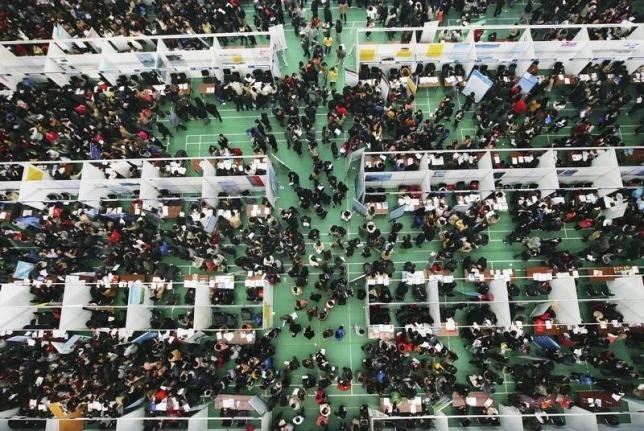A record high of 7.65 million students in China are set to graduate from college this year, dubbed as "the toughest graduation season," as they are expected to contend with lower starting salaries and a more competitive job market.
The Global Times reported on Thursday, May 26, that college graduates have the average starting salary of only 4,765 yuan ($726.2) this year, a drop from 4,793 yuan in 2015, according to career platform zhaopin.com.
Some migrant workers, who sometimes earn 8,000 yuan a month working in a construction site, received even higher than the starting salary of new graduates.
Data from the Ministry of Human Resources and Social Security (MOHRSS) show that compared to last year, the number of graduates has increased by 160,000 this year.
Although the employment rates of graduates are usually posted by Chinese colleges, media have criticized the data, which they said have been manipulated to improve the image of college administrations.
The employment of college graduates is therefore a cause for concern since low employment rate may lead to potential social problems in the future, the report said.
During Premier Li Keqiang's visit to the MOHRSS on May 6, he urged that greater support must be given to college graduates and migrant workers to prevent widespread unemployment.
This came at a time when China is restructuring its economy and some industries such as steel and coal are reducing capacity as part of the supply-side reform, which resulted in the layoff or relocation of about 1.8 million workers.
"Graduates are facing greater pressure finding jobs this year," Peng Jianfeng, a professor at the School of Labor and Human Resources of the Renmin University of China, said. "A greater number of students are graduating, but the economic downturn has stunted the number of jobs available."
In the first quarter, online job offers grew only 4 percent, lower than the 19-percent growth in the same period last year, according to zhaopin.com data.
But instead of taking up higher degrees, more graduates chose to work, with 75.6 percent of them opting to find jobs this year, higher than 71.2 percent last year, the same data showed.
The zhaopin survey also revealed that despite the government call for entrepreneurship, only a few graduates are willing to start their own business, with only 3.1 percent, lower than 6.3 percent last year.
In the past years, China's working-age population, those aged 16 to 59, has been on the decline, dropping from 4.87 million to 911 million in 2015, compared with a decline of 3.7 million in 2014, the government data showed. However, it did not mean that college graduates will find jobs easier.
Peng advised college graduates to adapt and change their job expectations.
"A good job does not necessarily mean one in state-owned firms or government, or a white-collar one," Peng said. "Starting an online business or becoming a freelancer could also be a good option after graduation."
Experts, however, said that the overall job market is performing well despite a decline in the manufacturing sector. Su Hainan, an expert at China Association for Labor Studies, told the Global Times that the services sector will stabilize the labor market this year.
The Chinese government said in March that it is aiming to create 10 million urban jobs in 2016 and keep the unemployment rate below 4.5 percent.
Su said that for three consecutive years, there has been more than 13 million new urban jobs and the economic growth is sufficient to generate that many jobs.



























